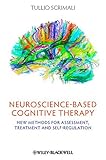Neuroscience-based cognitive therapy : new methods for assessment, treatment, and self-regulation / Tullio Scrimali.
Material type: TextLanguage: English Original language: Italian Publication details: Chichester, West Sussex, UK : Wiley Blackwell, 2012.Description: 1 online resourceContent type:
TextLanguage: English Original language: Italian Publication details: Chichester, West Sussex, UK : Wiley Blackwell, 2012.Description: 1 online resourceContent type: - text
- computer
- online resource
- 9781119943037
- 1119943035
- 9781119943044
- 1119943043
- 9781119943174
- 1119943175
- 9781119943181
- 1119943183
- 111999375X
- 9781119993759
- 9781119993742
- 1119993741
- 9781280585678
- 1280585676
- Neuroscienze e psicologia clinica. English
- 616.89/1425 23
- RC489.C63
- WM 425.5.C6
Includes bibliographical references and index.
Neuroscience, clinical psychology, and cognitive therapy -- The mind/brain problem -- Motor theories of mind and a complex biocybernetic model in neuroscience -- Complexity, chaos, and dynamical systems -- Modular and gradiental brain, coalitional mind -- Phylogenesis of the brain and ontogenesis of the mind : biological and cultural evolutionism -- Psychophysiology and clinical psychophysiology -- Electroencephalography and quantitative electroencephalography -- Electrodermal activity and quantitive electrodermal activity -- Complex psychological diagnosis and instrumental psychodiagnostics -- Complex psychological diagnosis with quantitative electroencephalography -- Complex psychological diagnosis with quantitative electrodermal activity -- Sets and settings when applying a neuroscience-based clinical methodology -- Multimodal assessment of family process and the family strange situation -- Biofeedback and cognitive therapy -- Meditation, mindfulness, and biofeedback-based mindfulness (BBM) -- Neurofeedback and cognitive therapy -- Psychofeedback and cognitive therapy -- Monitoring the warning signs of relapse in schizophrenia and bipolar disorder, and coping with them -- Get started with neuroscience-based cognitive therapy.
Print version record and CIP data provided by publisher.
A pioneer of CBT explores recent advances in neuroscience, showing how they can be applied in practice to improve the effectiveness of cognitive therapy for clients with a wide range of diagnoses including mood disorders, anxiety disorders, eating disorders and schizophrenia Utilizes the latest advances in neuroscience to introduce tools that allow clinicians, for the first time, to directly & lsquo;measure' the effectiveness of cognitive therapy interventions Rigorously based in neuroscientific research, yet designed to be readable and jargon-free for a professional market of CBT practitioners.
